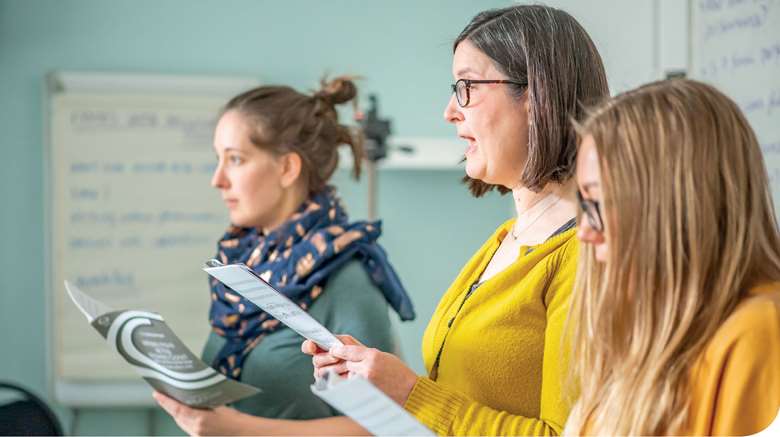RCM MEd Column: A creative curriculum
Liz Giannopoulos
Tuesday, October 1, 2019
As a leading institution in the world of music, it is no surprise that the Royal College of Music's education master's is providing a rigorous and varied studied in music pedagogy. Liz Giannopoulos reveals what it's like to study on the course

As the first year of the Royal College of Music's Master of Education draws to a close there is much for us to celebrate. During the first year we have all explored philosophical perspectives, socio-cultural theory, inclusive pedagogy, social justice, contexts, pedagogies and policy, assessment, participation, community and creativity, and music in the digital age. All of this will culminate in our individual educational philosophical statements which will be assessed in September 2019.
For most of us, the Personal Portfolio (comprising self-reflection, reflections on peers and mentors, curriculum project and professional development statement) just needs a few tweaks ahead of final submission. For those on the three-year programme, this module is yet to come.
Regardless of course length, we have all been introduced to a wide range of research methodologies, each completing a literature review, conducting interviews and observations, keeping diaries and coding and analysing data. All this has led to an Action Research Proposal.
Faraz and Philip who are on the one year programme will complete their course in September 2019 and have already finished their case studies.
A rich learning experience
Faraz looked at a youth orchestra in his home country, Iran, and analysed participant motivation. The orchestra is considered to be one of the first completely independent, local orchestras in Iran. It was established around seven years ago and performs mostly Western classical music. There is no curriculum for music education in Iran, and a negative attitude towards it in the traditional part of society, as well as other cultural and political issues have made this investigation very challenging. Faraz hopes his work results in making the way clearer for similar music activities in the future.
Philip's research was based on multi-instrumental work involving saxophone, flute and clarinet. As very little existing research was available on multi-instrumental work, he analysed literature involving ‘self-directed learning’ including the extent to which a multi-instrumentalist is self-directed in their learning of a second instrument. Through empirical research, participants described how they got into working multi-instrumentally, their motivational triggers, and the process through which they learned to play multiple instruments.
As Liz and Natalie move into their second and final year there will be a strong focus on their Action Research Projects.
Liz will be undertaking an extended research project to examine how formative assessment and dialogic feedback, from ungraded lesson observations, can inform professional development for peripatetic instrumental teachers. Her study this year has focussed on socio-cultural theory and the co-construction of knowledge through an evolving community of practice. With a collaborative approach to identifying assessment criteria, and employing a reflective feedback process, she hopes to explore how shifting the focus from quality assurance to quality improvement impacts engagement with, and ownership of, professional development goals and progress.
Observations in action
Natalie applied for this programme because she felt an obligation to share what she had been learning about working as a music teacher in prison. The modules this year have enabled her to understand and develop her teaching style. She is now in a position to academically investigate the perceived benefits of music in prison, from her autoethnographic viewpoint and the ethnographic perspective of her learners. She hopes this will lead to valuable insight into the benefits of prison music education, where music can act as the tool to promote wider development.
Anna and Hannah will be starting their personal portfolios in September 2019 and will complete their Action Research Projects in 2021. They will choose an additional module from options including directing ensembles in education, child development and composing with children.
Anna's research project on pedagogical sensitivity has evolved as a response to noticing how children make the transition into music lessons from elsewhere in the school. As a music teacher, she is responsible for guiding children in musical activities that can take them out of their comfort zones, potentially creating feelings of vulnerability. She is interested in how she responds to children's behaviours as they make these transitions, as well as the strategies she uses in order to focus energy and attention so that children are ready, willing and able to engage in music activities.
Hannah has noticed the focus for string players during a typical conservatoire education tends to be technical mastery and musical knowledge. Sometimes we forget that at heart we are performers – and performers that use our body on stage! Observing practitioners from other art forms such as dance, song and theatre, it becomes quickly apparent that concepts such as embodiment of the stage, physical gesture and communication are addressed earlier on and to a greater degree than in the average instrumental lesson. Her action research project will be to uncover strategies used in dance, song and theatre pedagogy and adapt them for use in a conservatoire context. By teaching focus groups of student string players from the Royal College of Music, she will acquire a breadth of insight into this area as well as new teaching methods for her practice.
It has been an intense year, with all the highs and lows you might expect. We stripped down our practice, analysed underlying theories, and ultimately rebuilt stronger philosophies. We were thrilled to meet some of the incoming cohort for 2019 and share our experiences of the course so far.
Anyone interested in the MEd programme at the Royal College of Music can find out more by contacting admissions@rcm.ac.uk or visiting www.rcm.ac.uk/med

